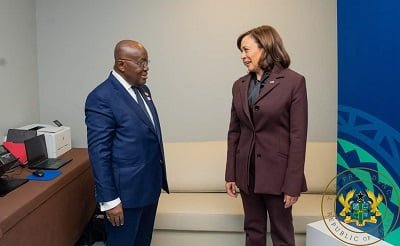News
US To Invest $1 billion On Youth And Education Programs In Africa
Published
3 years agoon
By
M N Ridwan
According to US Vice President Kamala Harris, the US government will spend $1 billion over the next two years on youth and education initiatives in Africa.
She claimed that the money will enable the nation to expand its collaboration with private businesses and university institutions in Africa on STEM education and research.
On Tuesday, she added that the investment would also enhance the US flagship program for African youth, the Young African Leaders Initiative (YALI), when speaking to the Africa and Diaspora Youth Forum at the ongoing US Africa Leaders Summit in Washington, DC.
The next phase of YALI was then introduced by Ms. Harris, who iterated that an additional investment of $100 million will be done in order to increase networking opportunities for alums of the program and link them with investors interested in social impact and business.
The three-day summit, the second since it began in 2014, brought together 49 African leaders, the chair of the African Union Commission, business leaders, representatives from civil society organizations, and youth leaders from Africa and the diaspora with the goal of strengthening the relationship between the US and Africa.
Young African Leaders Initiative (YALI)
YALI Regional Leadership Centers have been established to offer a comparable experience at higher education institutions in Ghana, Kenya, Senegal, and South Africa.
As a matter of fact, each year, YALI fellows are funded to travel to colleges and universities in the US for six weeks to study either business, civic engagement, or public management.
As a matter of fact, the YALI network currently has more than 640,000 young Africans as members.

According to Ms. Harris, the US Export-Import Bank will this week sign new memoranda of understanding with organizations in Sub-Saharan Africa to give more than $1 billion to finance American commercial investment in Africa, expanding financial prospects for creative African youngsters.
“This, we know and believe, will create jobs and opportunities in various sectors, and in particular, the renewable energy sector, in agriculture, water and sanitation, and infrastructure,” she emphasized.
A new program called the African Women’s Trade and Investment Initiative will also be introduced, according to Ms. Harris, to assist women in Africa in engaging in online commerce and gaining access to financing and export markets. This is because improving the economic status of women benefits society as a whole.
She also mentioned the reopening of the African Women Entrepreneurship Programme, which would give women access to micro-loans to support their goals and aspirations.
According to her, young people are supported since they are both the continent’s and the nation’s lifeblood.
“Just consider, 60 percent of the population of Africa is under the age of 25. That is nearly 850 million young people on the continent. And by 2050, that figure will grow to 1.2 billion people — 1.2 billion young people.
“This represents an enormous potential for the world in terms of economic growth and for social and political progress. So let us work together to foster the spark of creativity and ingenuity in Africa’s young leaders” he pointed out.
To that effect, President Akufo-Addo urged the African diaspora to support the continent’s development and the socioeconomic expansion of its citizens.

Conclusion
Stay tuned for more interesting news updates.





